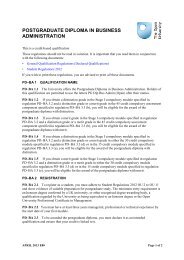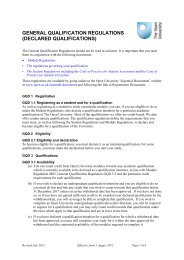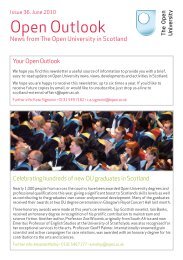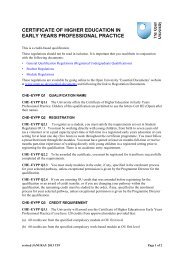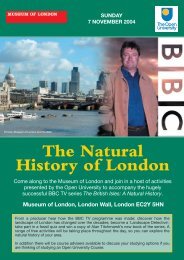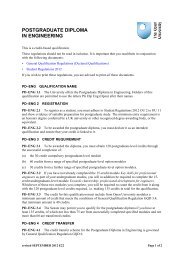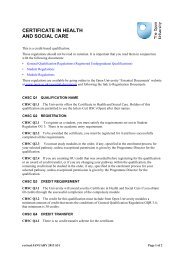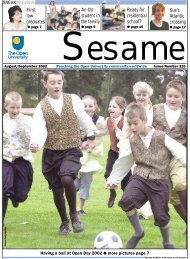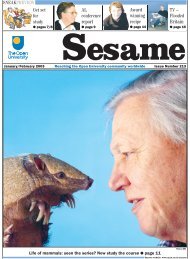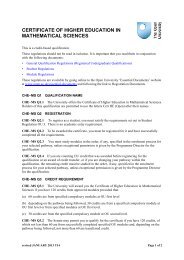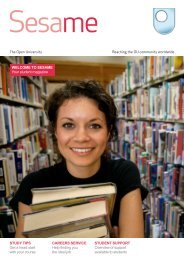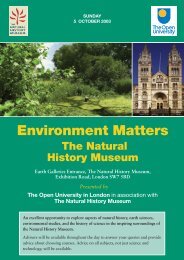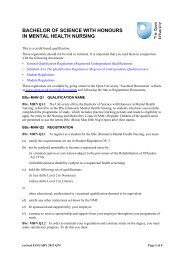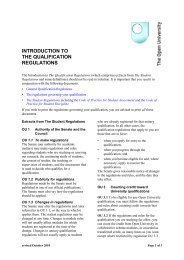Issue 208 <strong>April</strong>/<strong>May</strong> <strong>2002</strong> <strong>Sesame</strong> 12Happiness is an OU conference – at least, it is if it’s aboutpositive psychology.Well-being, joy, personal strengths, wisdom and creativityare all covered in this field of the science, which studies positiveaspects of experience to try to improve the quality of individualand community life.OU psychology graduate Ilona Boniwell joins OU staff JaneHenry and Dr Richard Stevens on the committee arrangingthis first European Conference on Positive Psychology,which is organised by the British Psychological Society’sConsciousness and Experiential Psychology Section and itsWessex and Wight branch.Ilona, who is also president and founder of the EuropeanStudent Committee for Positive Psychology, attained her fir s t -class degree in 2000 and is now working on her PhD thesis onthe optimal use of time for personal well-being.<strong>The</strong> keynote speakers for the event – at King Alfred’s College,Winchester, UK from June 28-30, <strong>2002</strong> – include formerAmerican Psychological Association president Prof. MartinSeligman (pictured above), and Prof Peter Warr from the<strong>University</strong> of Sheffield, a recipient of the BPS’s President’s Awardfor outstanding contribution to psychological knowledge.For registration and further details contact Ilona at3 Tolstoi Road, Parkstone, Poole, Dorset BH14 0QJ, on 01202251 378 or email: ilona@nt world.comConferencesW hy psychology study at th eOU is winning new audiencesLet’s think positive<strong>The</strong> distinction certainly mattersto us, which is why we aremaking a fuss! In its last issue,S e s a m e carried a report (Getorganised) of a workshop we ranfor the OU Systems Society in Londonon ‘Living Systemically: a space forpersonal exploration’. <strong>The</strong> workshopwas about helping people tochange aspects of their lives, notjust about organising themselvesbetter. But, more importantly, theword systemic in the item was misquotedas systematic, which has avery different meaning. This is acommon misunderstanding, so theeditor has given us this opportunityto explain the difference.<strong>The</strong> word systematic implies a linear,methodical, planned way of doing things.For instance, when you plan a holidayyou might make a list of things to do andthen tick them off when you’ve done them,to ensure that you haven’t forgotten anythingimportant. It’s common sense to besystematic in such circumstances.However you can also find yourselftrapped in messy situations from whichthere seems to be no way out. Part of theproblem is that these situations developover time and because of their inherentcomplexity they can’t be solved once andfor all. You live with them as part of yourdaily experience, they evolve as circumstanceschange, so the best you can do isto address them from time to time andaim to improve them.Systemic thinking can help you toexplore these kinds of situations and gobeyond common sense into uncommonsense, in order to break out of trappedways of thinking.<strong>The</strong> technology faculty offers an undergraduatediploma in systems thinkingand practice, and if you study this youwill learn to think and act systemically.Treating a situation systemically meansstepping back to perceive, think aboutand understand it as a whole, in all itscomplexity and interconnectedness.You’ve probably experienced situationswhere someone – perhaps a manageror a politician – has intervened to addressjust one aspect of a problematicsituation. But because of their limitedunderstanding of the situation as a whole,Blame ancesto rsfor our behav i o u rApplying the theories of Darwin to the development ofhuman behaviour as well as our bodies is a controversialscientific area, which is explored in a conferenceorganised this summer by the OU Psychology Society.Supporters of evolutionary psychology believe the roots ofsome of our social behaviour in the 21st century have a directevolutionary link to that of our distant ancestors. Are men, forexample, most likely to be jealous because their partner sleepswith someone else, but women more likely to be worried abouttheir partner falling in love?<strong>The</strong>se two rather different forms of jealousy have developedbecause of their relative value in ensuring reproductive successin past generations, according to Texan psychologist DavidBuss. Since humans first walked the earth, women would havechosen their mate carefully for his ability to reproduce andsupport the development of healthy offspring, while men, withmore extensive capacity to reproduce, would have been moreinterested in achieving multiple matings.Evolutionary psychology is, say its proponents, even a rootof moral behaviour, organised religion and altruism. LedaCosmides from the <strong>University</strong> of California believes wepurchase Christmas and birthday presents – depending on whomthey’re for – with a certain expectation that the recipient willbuy us something of similar value, because of our distantancestors. Currency may have changed over the years – food,forming alliances, commercial transactions – but our belief ina fair and just deal has its origins in our evolution.Key speaker at the conference, at Nottingham <strong>University</strong> fromJuly 5-7, is Paul Ekman, an American lecturer who will talk ondifferences and similarities in emotions among people ofdifferent cultures. Other topics include mate choice and parentingstrategies, human aggression from an evolutionary pointof view and the evolution of culture. Another topic – ‘Is autisman extreme form of the male brain?’ will be presented by SimonBaron-Cohen who is, as well as an autism expert from Cambridge<strong>University</strong>, the brother of Sacha Baron-Cohen – TV’s Ali G.Conference fee: £175 for OUPS members and £190 for nonmembers,including full-board campus accommodation. Initialenquiries to Denise Ward on 020 8876 9803 or email: DeniseMWard@aol.com . To book: Irene Baumgartl at PO Box 404, BromleyBR1 2WW, on 020 8315 0049 or at: Irene@baumgartl.fslife.co.ukSystematic or systemic –does it matter?Tony Wright and Karen Shipp of the technology facultyrespond to an article in <strong>Sesame</strong> 207.Tony Wright and Karen Shippthe intervention has had damagingunintended consequences elsewhere inthe system. Acting out of a systemicunderstanding means not ignoring thoseaspects of a situation – often to do withhuman interactions and feelings – thatare too complex to measure or test.This may all sound rather serious, butyou can often gain new insights throughcreative or playful activity, and this iswhat we did in the workshop. Althoughthis event was for people who have studiedsystems, we plan to offer another laterin the year, which will be open to all.Watch this space. (If you want to knowmore, contact Karen at the OU on 01908659770, or Tony on 01223 584666).R i c h a r d ’ snew job is amedia event<strong>The</strong> OU is planning a named degree in MediaStudies – and has a new professor to help see itthrough.Richard Collins (pictured above) joined the social sciencesfaculty in January and will be developing courses based on asubject he says the university has already been involved withfor decades.“Popular culture has formed a part of OU study almost rightfrom the start,” says Richard, the university’s first professorof the subject. “<strong>The</strong>re was a landmark course in the mid-1970s,Mass communication and society, and arts and social sciencesfaculties have offered courses with media aspects. Nowwe’re taking it that much further.”<strong>The</strong> rise in the popularity of the subject among students refle c t sthe increasing role the media play in all walks of life, he adds.“It’s becoming ever more important to the economy, it’sresponsible to a certain degree for globalisation, it has a hugeimpact on the internet and you can’t consider politics today– and the role some say spin plays in government – without alsoexamining the media,” he adds.“<strong>The</strong>re’s a great demand from students of all ages to learnabout the subject. More and more young people, for example,are taking media studies A-levels and AS levels. But there isless opportunity for teachers to be trained in the subject.Putting that right is a priority for the faculty of education andlanguage studies.”Richard will start to do so by gathering a committee to puttogether the content of two Level 2 courses, Introduction tomedia studies – scheduled to run from 2005 – and I n t r o d u c -tion to film and TV studies, planned for two years later.“We’ve done the first trawl of colleagues to see who is aroundand interested in coming on to the committee,” he says. “Andanyone who would like to be involved but hasn’t beencontacted is very welcome to get in touch with me. It’s veryimportant that someone who is interested is not left out.”Richard gained his experience through fellowships in theUSA, Canada, Australia and South Africa and his extensivecv also includes a stint teaching media studies at the LondonSchool of Economics and a spell as deputy director of theBritish Film Institute.And he is sure a named degree will be very popular amongOU students for a number of reasons.“<strong>The</strong> media has become an increasingly attractive careerin itself, but an understanding of media studies also greatlyb e n e fits the person in the street,” he says. “Media skills arerequired more and more in corporate communication, forexample, and in this day and age, can help anyone to understandmore about the world we live in.”G a ry upholdsthe law<strong>The</strong> first professor of law has been appointed at the OU,home to the UK’s largest law school which now has 3,000students.Dr Gary Slapper, currently Head of Law Programme as wellas a regular expert commentator in the national media, hasbeen given the Chair in recognition of his ‘path-cutting researchin the area of corporate crime and his prolific publication ofbooks and academic papers over 15 years’.He said: “Law touches virtually every aspect of our lives. Itregulates everything from embryo to exhumation, and neithernational presidents nor global corporations are beyond itsreach. I hope I can use this privilege to help promote thewidening of legal debates, and the range of participants in them.”
Issue 208 <strong>April</strong>/<strong>May</strong> <strong>2002</strong> <strong>Sesame</strong> 13Travellers talesA flower bloomsin Addis Ab a b aIkutha women collect waterVillagers benefitfrom a well ofOU kindnessBy Malini SenBonface Ndili’s crusade for water began with a visitto his childhood village Ikutha in Kenya after anabsence of 10 years. He went back to visit hisgrandmother and was shocked by the hardships facedby people in his village because of water shortages.Bonface, who is pursuing a Diploma in Social Welfarewith the School of Health and Social Welfare, iscommitted to taking water to the village.“An elderly woman and her daughter, who had given birththree days ago, were visiting my grandmother. <strong>The</strong> youngmother had not had a wash for weeks. She said she had just onedrink during the delivery. Young girls fetch water between schoollessons, mothers leave children for hours, sometimes for a dayand-a-half,to walk a distance of 20 to 60 miles to the river.“I felt I had to do something. I discussed it with my motherwho said: ‘It has been 25 years since Independence and thegovernment has done nothing about it. What can you do? Willyou go to heaven and bring water for the village?’”partnershipsIkutha is the gateway to the popular safari park Tsavo. <strong>The</strong>roads around the park have been developed and electricitylines have been drawn through Ikutha to supply power totourists. <strong>The</strong> village does not enjoy similar facilities – butBonface plans to provide a well.He said: “<strong>The</strong> OU course has taught me three key things: tofocus on people, assess a situation and build partnerships.”For any action to be taken, he needed the support of thevillage. “Women are the most affected by the water crisis andI needed to know what they felt. I told them: ‘I am notpromising the world. But I will go back to England and try andraise funds either to set up a water pump or to dig wells.’“Water is integral to human existence. Besides being importantfor health and sanitation, it is a source of livelihood. A steadysupply of water would help irrigate the land, feed livestock andtherefore generate income,” said Bonface, adding with a smile:“Since my return to England, my water bills have gone down.”Bonface’s tutor Anne Radforth, who has been verysupportive, said: “I share his vision and I am proud of what heis doing.” Anne is helping Bonface to set up a charity to fundthe project. He has named the project Maisha Bora (meaning‘Life Good’ in Swahili) and is determined that the villagers beself-reliant. “<strong>The</strong>y should feel proud of the project andhelp in maintaining the well,” he added. Bonface would behappy to receive any kind of support, contact him at:bm.ndili@talk21.com or on 01773 520722.Like the <strong>Open</strong> <strong>University</strong>, tutorsgo every w h e re as the BusinessS c h o o l ’s M a u reen Whitehead-L a u s m a n n explains in thisreport.Traffic is heavy on the way backfrom the tutorial venue; threelanes of cars in each direction,with drivers constantly switchinglanes, hoping to make some headwayin the stop-and-go queue. I crane myneck to see what is up ahead and seea donkey grazing on the grass vergewhich separates the lanes. But it isnot the donkey which is holding usup, nor is it the goats being herdedalong at the side of the road. This istypical rush hour traffic on the BoleRoad in Addis Ababa.My first visit here was a few years agowhen more than 100 of Ethiopia’s topmanagers and government officials setoff on B800 Foundations of seniorm a n a g e m e n tas a first step towards theirMBA. Since then I have returned 10times to deliver tutorials. As the studentshave progressed and graduated, so haslife in Addis. Roads have become busier,buildings have become newer and taller,and signs for Compaq, Dell and BM havesprung up along the Bole Road. Bole iswhere the International Airport and manyembassies are situated and, since 1997,the MBA centre provided by the Ethiopiangovernment for OU students.<strong>The</strong> Bole Road leads past MeskelSquare, a favourite meeting place forrunners in the city. My driver dropsme off at the palace guest house whereOU tutors are accommodated. <strong>The</strong>soldiers guarding the entrance eye mesceptically as I go through. <strong>The</strong> temperatureis pleasant as I walk through thegardens to the residence; although Addisis almost on the equator the climate ismild owing to the altitude of almost 2,500metres.<strong>The</strong> palace guest house itself is a twostoreyvilla. Its contents were describedby a colleague on a previous visit as astrange mixture of old colonial furnitureand ’60s MFI. Although Ethiopia wasnever fully colonised, a fact evident in theindependent mentality of its people, theinfluence of the Italian occupiers isevident in architecture and lifestyle.Sometimes when I can no longer faceanother traditional meal of injera (a typeof bread which looks like a pancake) andwot (a spicy sauce) I go out for pizza,spaghetti and cappuccino.As I am the only guest I reside inbedroom number one, and am lookedafter by a host of staff, some of whomserved in Haile Selassie’s court orremember the times of the militarydictatorship of Mengistu when, I am told,Tito was also a guest in bedroom numberone.thirteen monthsOne of the ladies on duty tells medinner is at one o’clock, which is 7pmby our clocks. <strong>The</strong> mealtimes no longerconfuse me as on my first visit I soonlearned that most Ethiopians set theirclocks from dawn to dusk. I still struggle,though, with the Julian calendar followedby Ethiopia, which is seven years andeight months behind the Westerncalendar. However, as it consists of 12months of 30 days and one month of fivedays, Ethiopia’s tourist board can boastof thirteen months of sunshine.Street scene in Ethiopia’s capital<strong>The</strong> OU’s development of its language coursesrecently took another step forward with theappointment of Jim Coleman.<strong>The</strong> university’s first professor of languages is working ona 10-year strategy to facilitate research into the subject, asignificant development for a department that was formedonly a decade ago.“<strong>The</strong> OU didn’t offer any language courses at all until the1990s,” says Jim, who came into post at the end of last year.“When it did, there was a treadmill of course creation whichleft little room for research.“People might think ‘language is language, we speak, sowhat is there to research?’” he says. “But we’re looking tofacilitate how language is taught, to make it a comfortableexperience for students.“When you learn a language you become someone else. YouIn the free time between tutorials Iget a chance to explore some of the sightsof Addis. I take a taxi to Mercato, Africa’sbiggest market where you can buyanything from a cow to a comb. When Ipass the row of sewing machinists Iremember Michael Palin had his trousersrepaired here in Around the World in 80D a y s. Back in the city I cross the piazza,another legacy of the Italians, withcolourful architecture and small, bustlingshops and cafés. Next, along ChurchillAvenue to buy Ethiopian coffee and othersouvenirs.Although poverty is evident everywhere,it seems the number of beggarshas fallen over the years of myvisits. <strong>The</strong> people are dressed either intypical Western clothes or traditionalEthiopian dress. My lasting impressionis of a colourful bustling city, which ismaking progress fast. <strong>The</strong> name given tothe city by Taytu, wife of EmperorMenelik II, just over 100 years ago, ondeciding to settle there, seems apteven today. Addis Ababa means NewFlower and to me it is a flower which isgradually opening to full bloom.Picture: Raewyn SoerJim breaks through the language barrierlearn the knowledge, such as the words and the grammar, butyou also develop skills – how to make sounds and interact. Itbecomes a subject about personal identity and attitude.Research into how people can learn a language, especially ata distance, doesn’t just embrace linguistics, it coverseducation and even psychology.“Our research has got to be not just about teachinglanguage, but teaching people how to learn a language andbuild their confidence. You speak a language better throughuse, speaking, listening, reading and writing, and we’ve gotto help students who have only the minimum of face-to-facetutorial contact.”He adds: “<strong>The</strong> OU is the only place with the long-termperspective and resources to make a success globally ofdistance language learning. I always had a great respect forthose who are now my colleagues.”



